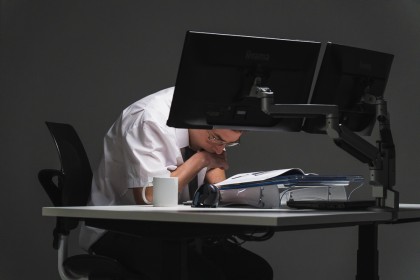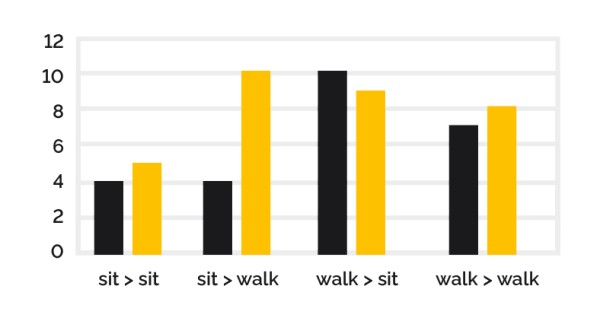Our solutions
Back
The balance between effort and recovery moments
In order to perform work, people have to make an effort. Although work can give a person satisfaction, from a physiological point of view work effort is inevitably accompanied by a certain loss of energy. Therefore, after exerting yourself for some time at work, you occasionally feel mentally or physically fatigued. This fatigue decreases when you take a break, slow down the pace, or do something completely different.
The Effort-Recovery Model
The theoretical framework underlying these considerations, the Effort-Recovery Model, was developed by Professor Emeritus Theo Meijman (Van Veldhoven, 2008). This model considers recovery from work as the natural counterpart of daily work effort and stress. It describes that damage to health can be prevented in roughly two ways: firstly by sufficient recovery during working hours and secondly by sufficient recovery outside working hours.
Sufficient recovery time during work therefore prevents fatigue and stress from building up too much. A short rest contributes to a healthy effort-recovery balance of the employee and improves mental and physical well-being, which also benefits work performance and motivation. It is therefore important for the health of employees and the quality of work that they are given sufficient opportunity during the working day to regularly take a break and recover from their work. The more intensive and demanding the work, the greater the need for a good recovery. The work environment can support the recovery of employees by giving them the opportunity to take care of their own (psychophysiological) recovery at set times.
The consequence of mental fatigue during work is that we function less well. The attention wanes and the mind wanders more easily. If work permits,
employees to adjust their activities accordingly. They take a break or do something else. Characteristic of this fatigue is the short-term reversibility: this decreases by taking rest or by doing an activity that calls on another person's mental functioning. If it is not possible to take a rest, the work can only be continued if the employee ignores the psychological resistance and makes extra effort. In a cognitive-energetic sense, the employee has to go the extra mile. This is known as "compensatory effort." In a physiological sense, this extra effort is accompanied by an increase in stress reactions, which leads to an increase in attention in the brain. At the same time, this is accompanied by a decrease in motivation and emotional changes such as irritation. When there are too few moments of relaxation during the working day, employees can notice this in the evening and at night. They worry more, are less able to distance themselves from work and sleep less. They start the next working day more tired (Gaillard, 2003), (Sluter et al., 2003).
Sufficient recovery time during work therefore prevents fatigue and stress from building up too much. A short rest contributes to a healthy effort-recovery balance of the employee and improves mental and physical well-being, which also benefits work performance and motivation. It is therefore important for the health of employees and the quality of work that they are given sufficient opportunity during the working day to regularly take a break and recover from their work. The more intensive and demanding the work, the greater the need for a good recovery. The work environment can support the recovery of employees by giving them the opportunity to take care of their own (psychophysiological) recovery at set times.
The consequence of mental fatigue during work is that we function less well. The attention wanes and the mind wanders more easily. If work permits,
employees to adjust their activities accordingly. They take a break or do something else. Characteristic of this fatigue is the short-term reversibility: this decreases by taking rest or by doing an activity that calls on another person's mental functioning. If it is not possible to take a rest, the work can only be continued if the employee ignores the psychological resistance and makes extra effort. In a cognitive-energetic sense, the employee has to go the extra mile. This is known as "compensatory effort." In a physiological sense, this extra effort is accompanied by an increase in stress reactions, which leads to an increase in attention in the brain. At the same time, this is accompanied by a decrease in motivation and emotional changes such as irritation. When there are too few moments of relaxation during the working day, employees can notice this in the evening and at night. They worry more, are less able to distance themselves from work and sleep less. They start the next working day more tired (Gaillard, 2003), (Sluter et al., 2003).
Pitstops
Psychosocial and physical strain during work is difficult to measure, but it is clear that a moment of physical and mental disconnection from work is essential to regularly recharge our battery to be able to work concentrated, perform best and not just energetic get through the day, but also be able to end energetically. A while away from work leads to higher average performance, more creativity, better concentration and more energy.
Introducing pit stops during fencing increases work speed and reduces errors (Van den Heuvel et al., 2003), (Hedge & Evans, 2001). When employees leave their workplace and walk during these pit stops, energy levels rise and employees look at problems differently when they return (Nathan & Thayer, 2012, p. 411). This leads to more creativity and better problem solving (Oppezzo & Schwartz, 2014).
Introducing pit stops during fencing increases work speed and reduces errors (Van den Heuvel et al., 2003), (Hedge & Evans, 2001). When employees leave their workplace and walk during these pit stops, energy levels rise and employees look at problems differently when they return (Nathan & Thayer, 2012, p. 411). This leads to more creativity and better problem solving (Oppezzo & Schwartz, 2014).

Need help? We're here for you
Look at our FAQ or contact us
Many customers preceded you
Read about their experience with BakkerElkhuizen
Select your country and language



